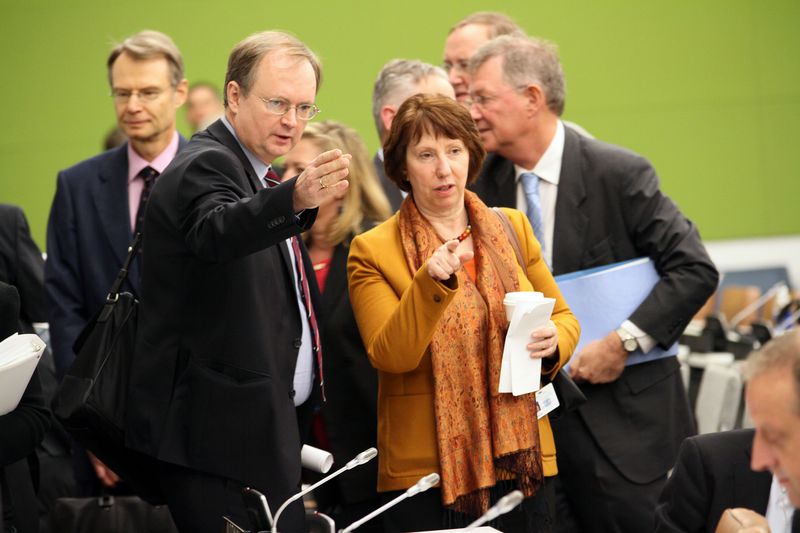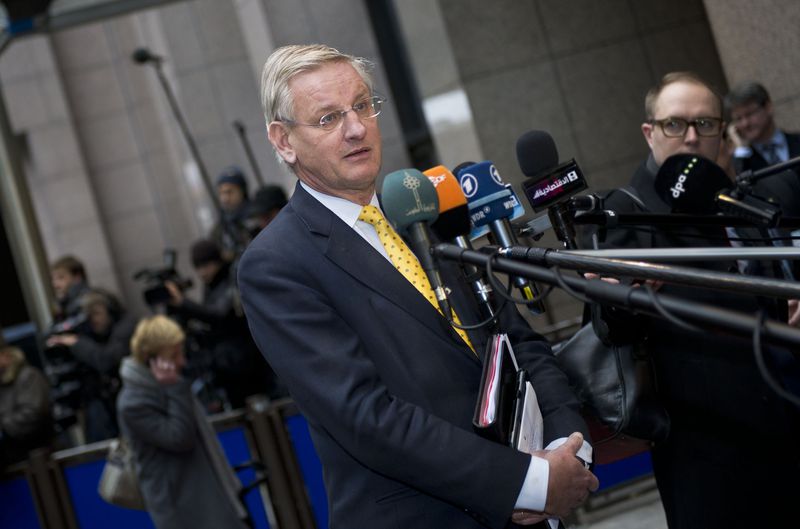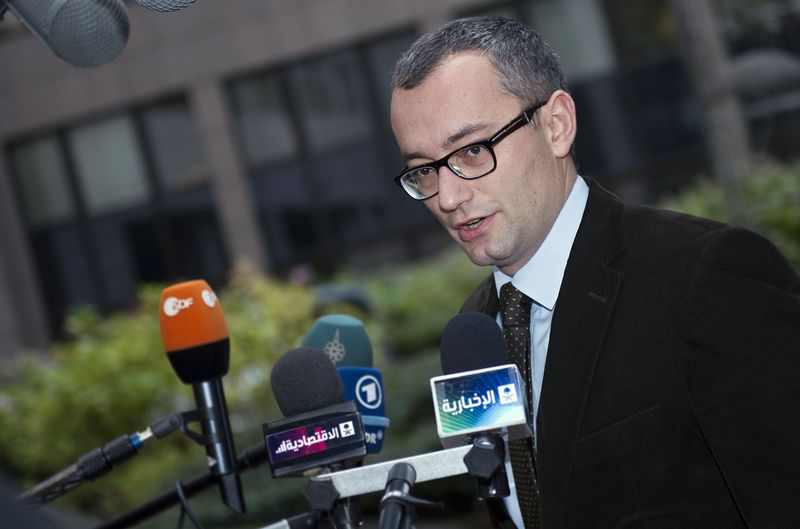Who Led and Who Slacked in EU Foreign Policy in 2012?
Zhaneta Kuyumdzhieva, April 5, 2013
 There will hardly be someone who could deny that the crisis has driven out to the sidelines the EU's common foreign policy and we got used to looking at it in that period as something that allegedly is there, but no one has ever seen to prove it exists. For a third year in a row, the European Council on Foreign Relations (ECFR) does the EU Foreign Policy Scorecard. From the 2013 issue it can be seen that on global stage Europe has scored in 2012 better results than the previous two years. In some cases the results are even encouraging.
There will hardly be someone who could deny that the crisis has driven out to the sidelines the EU's common foreign policy and we got used to looking at it in that period as something that allegedly is there, but no one has ever seen to prove it exists. For a third year in a row, the European Council on Foreign Relations (ECFR) does the EU Foreign Policy Scorecard. From the 2013 issue it can be seen that on global stage Europe has scored in 2012 better results than the previous two years. In some cases the results are even encouraging.
The Scorecard studies the overall performance of the 27 member states acting individually, in groups or at the level of the EU institutions. In this way, on the basis of the behaviour of the countries in 79 individual aspects in six directions - policy toward the US, China, Russia, the Middle East, the North Africa countries and global issues related to disarmament, UN, etc. - the experts with the think-tank highlight some essential new conclusions about the EU's foreign policy capacity three years since the beginning of the crisis and as many from the Lisbon Treaty.
Countries-leaders
As a criterion to put a country in the category "leader" or "slacker" the analysis uses responsibility or its absence on national level for the common foreign policy goals of the EU. It is precisely along the line of being enterprising that the first essential conclusions emerge from the annual scorecard. To the "three big", which expectedly are Germany, France and Britain, in 2012 with big strides approach Sweden, The Netherlands and Poland. Compared to the results in 2011, there is a decline in the "leading" role of Berlin, Paris and London. In the past year, the merits for the EU's foreign policy successes are Germany's in 12 cases and Sweden's in 10 cases, moreover the latter has a leading role in at least one individual topic in all of the six directions. This shows the country's commitment to the entire spectrum of foreign policy interests of the EU and is not only a demonstration of being enterprising in zones that are entirely of national interest.
And although 2012 will remain to a large extent a very problematic period in the relations between Brussels and London, the United Kingdom has kept its leading position among the authors of the contemporary foreign policy. An example for its commitment we can clearly find in the context of the UN - the debates on the Millennium Goals framework (the eight specific areas where countries on global level have committed to work jointly to reduce poverty, improve health care, encourage peace, human rights and sustainable environment), as well as the country's participation in smaller formats such as the E3 + 3 (the "three big" in the EU, China, Russia and the US) for united diplomatic efforts to handle Iran's nuclear programme.
There is no coordination in creating contacts with the Syrian opposition, but instead there is initiative, the analysis points out. The most active in this aspect in 2012 were France and Britain. According to the analysts, their leading roles here "did not seem to be closely coordinated between themselves or with the other member states".
The criticism to Germany, which undoubtedly is the leader of the member states in the EU's foreign policy, is related to the growing "special partnership" with China. On the occasion of the two visits of the German chancellor in the Asian country in the past year, the analysis comes to the conclusion that "in fact, rather she [Angela Merkel] than the so called troika seemed to be the key partner of China in terms of the eurocrisis". The experts' Scorecard also recalls the case from September 2012 when Germany as if did not support and even undermined the Commission's efforts against the Asian giant on the occasion of provision of illegal subsidies for the producers of solar panels.
The first countries that are next to the "three big" are Sweden, The Netherlands and  Poland with respectively 10, 8, 5 score. The weak spots of Stockholm and Warsaw are in their contribution to the strategic dialogue with China and for Amsterdam it is the problems around the visa liberalisation with Ukraine, Moldova and Russia.
Poland with respectively 10, 8, 5 score. The weak spots of Stockholm and Warsaw are in their contribution to the strategic dialogue with China and for Amsterdam it is the problems around the visa liberalisation with Ukraine, Moldova and Russia.
The category of "slackers"
In the other end of the scale are the "slackers" - with the highest number of inadequate participation in the EU foreign policy initiative are Greece, Latvia, Romania, Spain, Lithuania and Portugal. Our southern neighbour scores weak in terms of financial aid and its contribution to the EU security and defence missions. According to the 2013 Scorecard, 2012 passed for Greece mainly under the sign of putting under control the economic crisis. The not good performance of Latvia in the strategic dialogue with China in terms of human rights as well as the political liberalisation with Belarus are the main reasons the country to be put in the "weak" group. But it emerges as a leader together with Romania in the efforts to soften the visa regime with Ukraine, Russia and Moldova.
The progress of our northern neighbour with the eastern partners, however, is not sufficient and Bucharest lines up among the "slackers" with almost the same arguments as Riga, but also with another weak spot - the Serb-Kosovo issue. Regarding Spain and Portugal, the internal and economic problems, according to the analysts, are the most probable reason for their unsuccessful performance on the foreign policy arena. Madrid gets a praise only for its contribution to the security and defence missions and the financial aid for countries in the Middle East and North Africa. But exactly in these aspects, as well as in terms of humanitarian aid for Sahel and the human rights protection in China, the other country from the peninsula - Portugal - gets "black points".
Bulgaria - enterprising, but not quite
 According to the annual Scorecard, with Bulgaria the situation is "50-50" - neither to complain from us nor to praise us. The country has one leg in the successful group in terms of its contribution to the missions in Afghanistan and the UN arms trade agreement. The other leg hampers the common European efforts in the dialogue for trade liberalisation with China and in spite of the stated commitment by the decision former Foreign Minister Nickolay Mladenov to join his colleagues from Sweden and Poland on a tour in the North African countries and the Middle East, Bulgaria has not increased its financial contribution to the EU aid for the region.
According to the annual Scorecard, with Bulgaria the situation is "50-50" - neither to complain from us nor to praise us. The country has one leg in the successful group in terms of its contribution to the missions in Afghanistan and the UN arms trade agreement. The other leg hampers the common European efforts in the dialogue for trade liberalisation with China and in spite of the stated commitment by the decision former Foreign Minister Nickolay Mladenov to join his colleagues from Sweden and Poland on a tour in the North African countries and the Middle East, Bulgaria has not increased its financial contribution to the EU aid for the region.
The general picture of the foreign policy in 2012
In terms of the general assessment of the European foreign policy, the best scores are in the relations with the US to suppress Iran's ambitions for armament and arms distribution, as well as on the Syrian issue. Using the school 6-grade evaluation system, the ECFR experts evaluated EU's efforts in 2012 as "very good" (5) on the Kosovo issue, trade relations with the eastern neighbours (Georgia, Armenia, Moldova, although with Ukraine progress is insignificant) and the partnership with China in the context of handling climate change, as in the latter aspect the evaluation is lower - "good" (4).
Weakest is Brussels's performance in the area of security reform in the Middle East countries and North Africa. This aspect of the foreign policy aims to assist the laying of the necessary foundations of democratic governance - rule of law, order, border control - for which EU's experience could be very useful. In the past year, although individually and in groups some member states implemented specific projects for consolidation of the democratic transitions in the Arab world (trainings, exchange of good practises, etc), Brussels did not take part directly in such initiatives.
 Klaus Regling | © Council of the EU
Klaus Regling | © Council of the EU Mario Centeno | © Council of the EU
Mario Centeno | © Council of the EU Mario Centeno | © Council of the EU
Mario Centeno | © Council of the EU